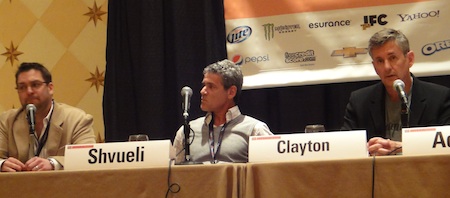SXSW Report: Voice and Gesture Will Control the TV of the Future
"It shouldn't be rocket science to do this kind of stuff," said Gary Clayton, chief creative officer for Nuance Communications, talking about the interface that will control television going forward. It's about getting consumers what they want, he said; it needs to be ubiquitous, have a single interface, and make the pain of finding and controlling content go away.
Consumers will soon be faced with far more content options than ever before. Having a half-dozen remotes on the coffee table is a poor way to sort through it.
In the future, Clayton said, viewers won't care where content comes from. Distribution channels will cease to matter. What will matter is getting consumers content as fast as possible. Even what's called a television will cease to matter; a TV can be any screen showing content.
"Just the word ‘television,' it sounds so midcentury," Clayton said.
The question for interface designers is whose voice tomorrow's TV will listen to? When there are multiple people in a room watching TV, how can manufacturers offer simple voice control? Clayton thinks the answer will combine voice and gesture, making them work together.
 When creating the next generation of TV interface, Clayton said it's important to get it right the first time. Consumers need value (or perceived value) to change their behavior. If voice is going to work, it needs to offer value. If the first companies to launch voice control interfaces don't get it right, they'll screw it up for everyone involved, he said.
When creating the next generation of TV interface, Clayton said it's important to get it right the first time. Consumers need value (or perceived value) to change their behavior. If voice is going to work, it needs to offer value. If the first companies to launch voice control interfaces don't get it right, they'll screw it up for everyone involved, he said.
Voice systems need to be far better with natural language understanding, Clayton said. If systems can understand natural language combined with gesture, than individual words won't matter as much; the TV will get the gist and do what the viewer wants.
There's no standards body in charge of TV remote communications, but Clayton said that ideas Apple has pushed out have become de facto standards. While Apple tries to protect it's ideas, once they're out in the market they get adopted by other companies.
"it's a really cool time to be in this arena figuring this stuff out," Clayton added.
Related Articles
Voice recognition is the future of video search, bringing viewers an intelligent system that delivers exactly what they want—but getting there won't be easy.
30 Jun 2017